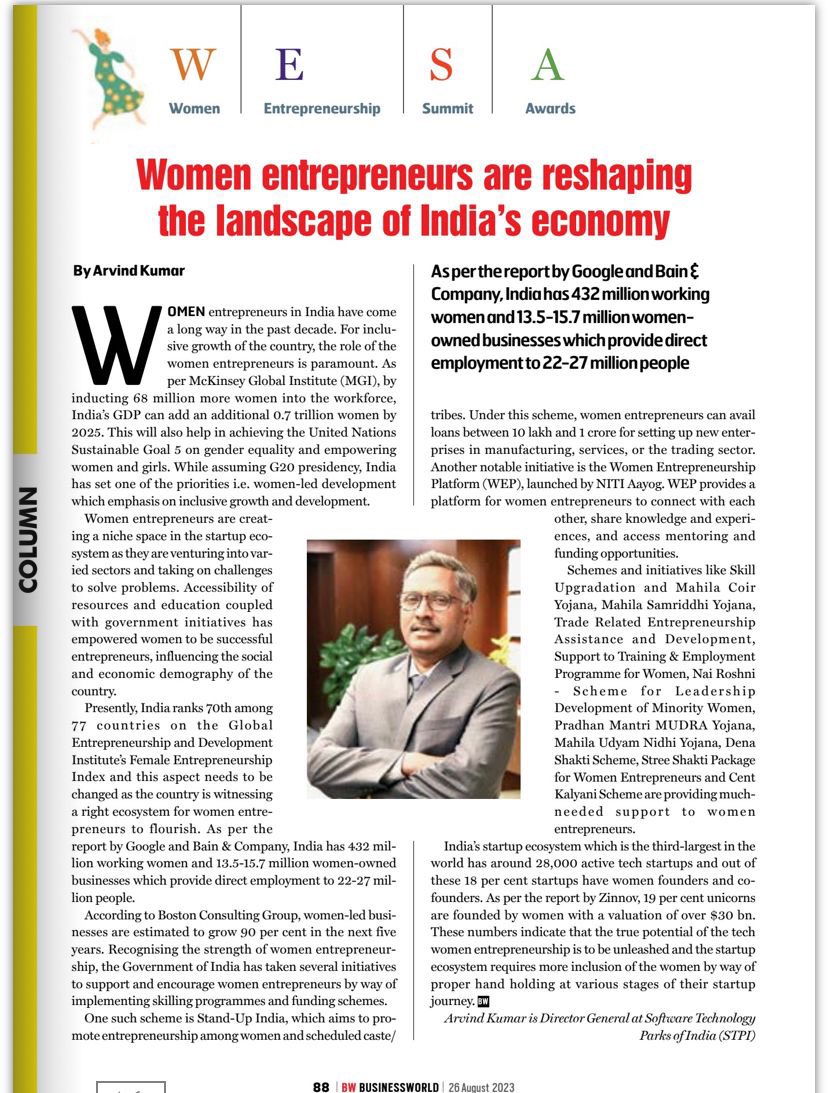Women Entrepreneurs Are Reshaping The Landscape Of India’s Economy
- 22-08-2023

As per the report by Google and Bain & Company, India has 432 million working women and 13.5-15.7 million women-owned businesses which provide direct employment to 22-27 million people
Women entrepreneurs in India have come a long way in the past decade. For inclusive growth of the country, the role of the women entrepreneurs is paramount. As per McKinsey Global Institute (MGI), by inducting 68 million more women into the workforce, India’s GDP can add an additional 0.7 trillion women by 2025. This will also help in achieving the United Nations Sustainable Goal 5 on gender equality and empowering women and girls. While assuming G20 presidency, India has set one of the priorities i.e. women-led development which emphasis on inclusive growth and development.
Women entrepreneurs are creating a niche space in the startup ecosystem as they are venturing into varied sectors and taking on challenges to solve problems. Accessibility of resources and education coupled with government initiatives has empowered women to be successful entrepreneurs, influencing the social and economic demography of the country.
Presently, India ranks 70th among 77 countries on the Global Entrepreneurship and Development Institute's Female Entrepreneurship Index and this aspect needs to be changed as the country is witnessing a right ecosystem for women entrepreneurs to flourish. As per the report by Google and Bain & Company, India has 432 million working women and 13.5-15.7 million women-owned businesses which provide direct employment to 22-27 million people. According to Boston Consulting Group, women-led businesses are estimated to grow 90 per cent in the next five years. Recognising the strength of women entrepreneurship, Government of India has taken several initiatives to support and encourage women entrepreneurs by way of implementing skilling programmes and funding schemes.
One such scheme is Stand-Up India, which aims to promote entrepreneurship among women and scheduled caste/tribes. Under this scheme, women entrepreneurs can avail loans between 10 lakh and 1 crore for setting up new enterprises in manufacturing, services, or the trading sector. Another notable initiative is the Women Entrepreneurship Platform (WEP), launched by NITI Aayog. WEP provides a platform for women entrepreneurs to connect with each other, share knowledge and experiences, and access mentoring and funding opportunities. Schemes and initiatives like Skill Upgradation and Mahila Coir Yojana, Mahila Samriddhi Yojana, Trade Related Entrepreneurship Assistance and Development, Support to Training & Employment Programme for Women, Nai Roshni - Scheme for Leadership Development of Minority Women, Pradhan Mantri MUDRA Yojana, Mahila Udyam Nidhi Yojana, Dena Shakti Scheme, Stree Shakti Package for Women Entrepreneurs and Cent Kalyani Scheme are providing much-needed support to the women entrepreneurs.
India’s startup ecosystem which is the third-largest in the world has around 28,000 active tech startups and out of these 18 per cent startups have women founders and co-founders. As per the report by Zinnov, 19 per cent unicorns are founded by women with a valuation of over $30 bn. These numbers indicate that the true potential of the tech women entrepreneurship is to be unleashed and the startup ecosystem requires more inclusion of the women by way of proper hand holding at various stages of their startup journey.
Shifting its focus from women development to women-led development, the government has started working to maximise their access to education, skill training, and institutional credit. The rise of women's empowerment and entrepreneurship in India is a powerful force driving economic growth, social progress, and gender equality. The government's schemes and initiatives are crucial enablers that provide the necessary support and resources for women entrepreneurs to succeed. By addressing challenges and fostering an ecosystem of opportunities, India can unlock the full potential of women entrepreneurs, leading to a more prosperous and inclusive future.
Arvind Kumar, Director General, Software Technology Parks of India
(Disclaimer: The views and opinions expressed in the aforesaid article are personal)

